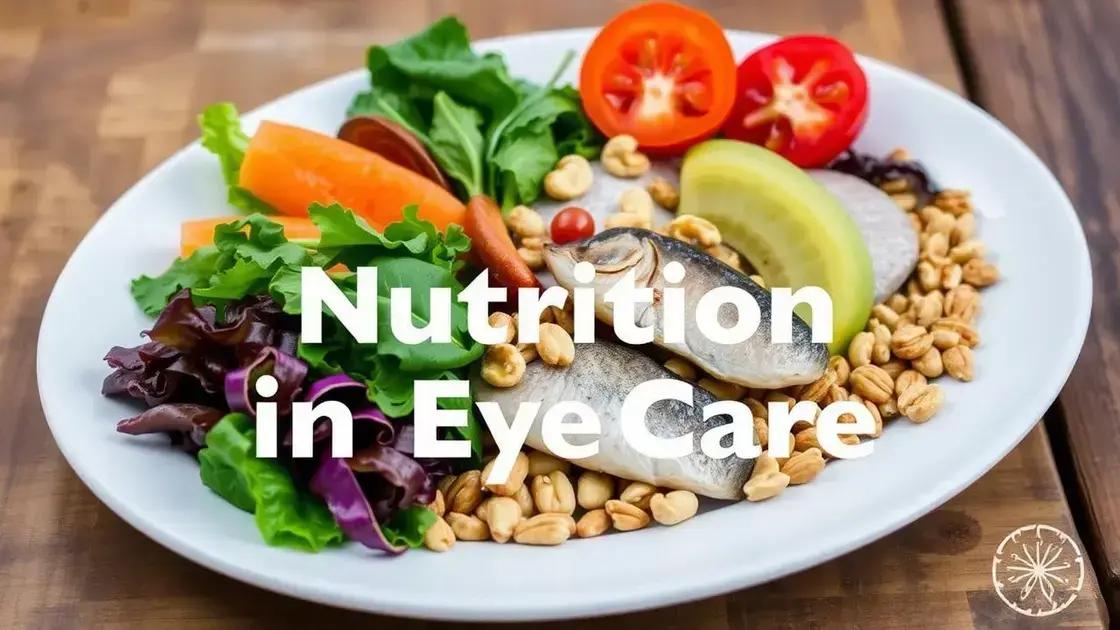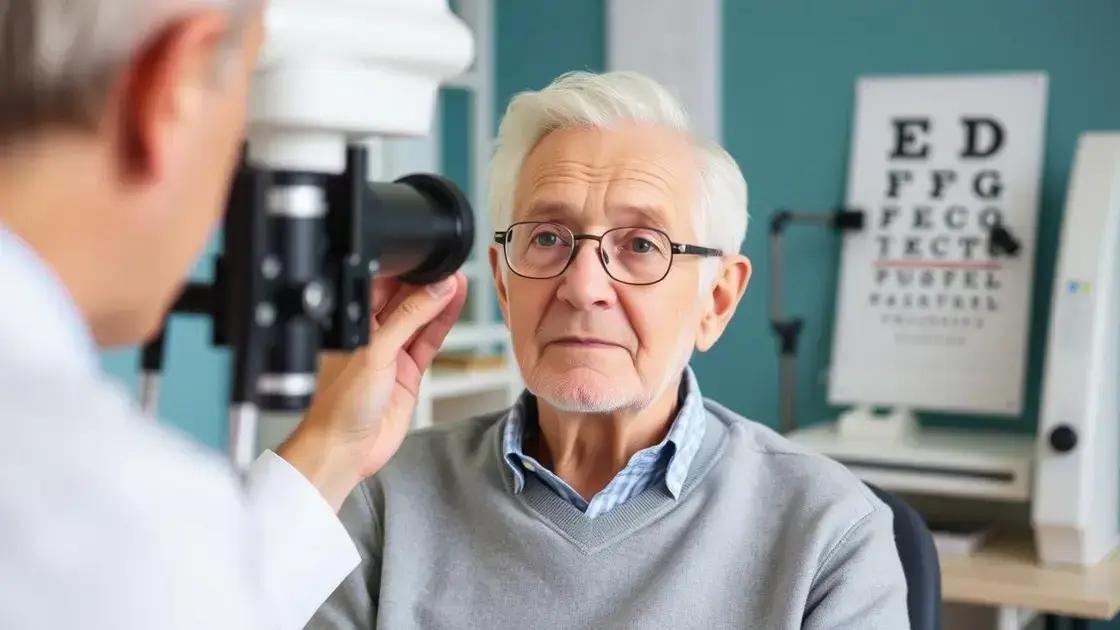Maintaining eye health after 50 is crucial and involves regular eye check-ups, understanding common age-related eye issues, and a nutritious diet rich in vitamins and omega-3 fatty acids to prevent vision loss and promote overall well-being.
As we age, maintaining our eye health becomes increasingly important. How to maintain eye health after 50 involves understanding the changes our vision may experience. Aging can bring about various eye conditions that threaten our sight. Therefore, knowing how to protect our eyes through proper care, nutrition, and regular check-ups is essential. In this article, we will explore the significance of eye health in our golden years, identify common eye issues, and provide practical tips to keep your vision sharp.
Importance of Eye Health After 50

Maintaining eye health after 50 is critical to enjoying a better quality of life. As we age, our eyes undergo various changes. These changes can lead to vision problems that can significantly impact our daily activities and overall well-being. Why is eye health important after 50? Let’s explore.
Increased Risk of Eye Conditions
People over 50 are at a higher risk for eye diseases such as cataracts, glaucoma, and age-related macular degeneration. These conditions can lead to vision loss if not detected and treated early. Regular check-ups become vital to monitor and manage these risks.
The Role of Vision in Independence
Good vision is closely linked to maintaining independence. Compromised eyesight can hinder activities like driving, reading, and participating in social groups. By prioritizing eye health, individuals can continue enjoying their hobbies and staying connected with loved ones.
Impact on Overall Health
Eye health can also reflect overall health. Conditions like diabetes and hypertension can manifest through changes in eye health. Keeping track of eye conditions can provide early warning signs for systemic health issues, encouraging proactive management.
Quality of Life and Mental Health
Maintaining good vision enhances the quality of life and contributes positively to mental health. Poor vision can lead to feelings of isolation and depression. By focusing on eye health, individuals can boost their confidence and social interactions.
Common Eye Issues in Older Adults

As we age, certain eye issues become more common. Understanding these common eye issues in older adults is crucial for maintaining eye health.
Cataracts
Cataracts occur when the lens of the eye becomes cloudy. This can cause blurry vision and difficulty in seeing at night. Cataracts are very common in older adults, and they usually develop slowly. Surgery can effectively restore vision.
Glaucoma
Glaucoma is a group of eye diseases that damage the optic nerve, often due to increased pressure in the eye. It can lead to vision loss and even blindness if not treated. Regular eye exams are essential for detecting glaucoma early.
Age-related Macular Degeneration (AMD)
Age-related macular degeneration affects the central part of the retina, leading to blurry vision or loss of central vision. There are two types: dry and wet AMD. Both types require proper management and regular check-ups.
Dry Eye Syndrome
Dry eye syndrome is common with aging and involves insufficient tear production. Symptoms include dryness, irritation, and redness in the eyes. Treatment can range from eye drops to prescription medications.
Diabetic Retinopathy
For those with diabetes, diabetic retinopathy is a serious condition. It occurs when high blood sugar levels damage the retina. Regular eye exams can help monitor and treat this condition effectively.
Nutrition and Eye Care

Nutrition plays a vital role in maintaining eye health, especially after the age of 50. A balanced diet can provide essential nutrients that support vision and protect against eye diseases.
Key Nutrients for Eye Care
Certain nutrients are particularly beneficial for eye health. Vitamin A helps maintain good vision, especially in low light. C and E vitamins provide antioxidant properties that protect the eyes from damage.
Omega-3 Fatty Acids
Omega-3 fatty acids are vital for eye health. These healthy fats support the retina and may help prevent dry eyes. Sources include fish, walnuts, and flaxseeds.
Leafy Greens and Colorful Fruits
Leafy greens like spinach and kale are packed with lutein and zeaxanthin, which protect against harmful light. Fruits like oranges and berries are high in vitamin C, crucial for eye health.
Avoiding Unhealthy Foods
Foods high in sugar and unhealthy fats can negatively affect eye health. Consuming a lot of processed foods may increase the risk of health conditions that can impact vision, such as diabetes.
Hydration Matters
Staying hydrated is essential. Drinking plenty of water helps maintain moisture in the eyes and reduces the risk of dry eyes, especially in our older years.
Regular Eye Check-ups: Why They Matter

Regular eye check-ups are essential for maintaining eye health, especially for those over 50. Why should you prioritize eye exams? Let’s dive into the importance of these appointments.
Early Detection of Eye Diseases
During an eye exam, an eye doctor can identify problems before symptoms appear. This includes serious issues like glaucoma and macular degeneration. Detecting these conditions early allows for timely treatment, which can prevent vision loss.
Updating Prescription for Glasses or Contacts
As we age, our vision can change. Regular check-ups ensure that prescriptions for glasses or contact lenses are up-to-date. Clear vision positively impacts daily activities such as reading, driving, and using computers.
Assessing Overall Health
Eye exams are not only about vision. They can reveal underlying health problems like high blood pressure and diabetes. By monitoring eye health, you gain insights into your overall well-being.
Importance of Routine Exams
It is recommended that adults over 50 have their eyes examined at least once a year. This routine care helps to track any changes in vision and eye health over time.
Building a Relationship with Your Eye Doctor
Regular visits allow you to build a relationship with your eye doctor. They can provide personalized care and advice based on your specific needs and medical history.
In Conclusion: Prioritizing Eye Health After 50
Maintaining eye health after 50 is crucial for enjoying life to the fullest. Regular eye check-ups, understanding common eye issues, and focusing on nutrition are essential steps.
By recognizing the importance of vision and taking proactive measures, you can significantly enhance your quality of life. Simple tips, like eating right and scheduling regular examinations, can prevent serious conditions and keep your eyes healthy.
Do not wait for symptoms to arise; make eye care a priority and ensure that you enjoy clear vision for years to come.
FAQ – Frequently Asked Questions About Eye Health After 50
Why are regular eye check-ups important for those over 50?
Regular eye check-ups can help detect eye diseases early, update prescriptions, and monitor overall health, ensuring better vision management.
What are common eye issues that older adults face?
Common issues include cataracts, glaucoma, age-related macular degeneration, dry eye syndrome, and diabetic retinopathy.
How does nutrition impact eye health?
Nutrition provides essential nutrients like vitamins A, C, E, and omega-3 fatty acids, which support eye health and can help prevent eye diseases.
What should I include in my diet for better eye health?
Incorporate leafy greens, colorful fruits, fish high in omega-3 fatty acids, nuts, and plenty of water for optimal eye health.
How often should I have my eyes examined after age 50?
It is recommended to have your eyes examined at least once a year to monitor changes in vision and eye health.
Can eye problems indicate other health issues?
Yes, eye problems can be signs of other health conditions like high blood pressure and diabetes, making regular exams crucial.













